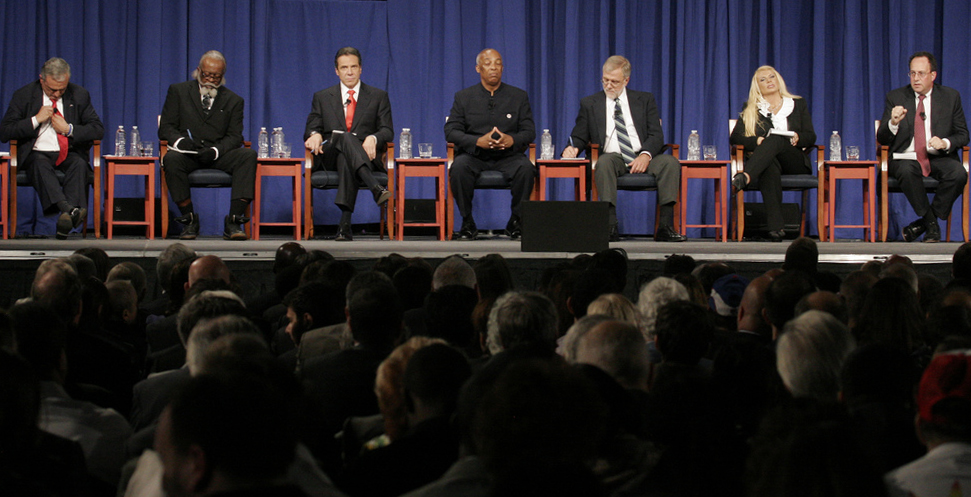

New York State residents, including SUNY New Paltz students, tuned in to watch the seven candidates running for governor in the first (and likely last) gubernatorial debate of this election season on Monday, Oct. 18.
Between the laughter and recurring catch phrases of the 90-minute debate, which was hosted by Cable News Channel 12, the candidates discussed New York State’s $8.2 billion deficit, education inequities, unemployment and environmental issues.
Front-runners Attorney General and Democratic candidate Andrew Cuomo and Republican candidate Carl Paladino said they felt Medicaid and education reform would be effective ways of keeping the state’s deficit under control.
According to Paladino, the state spent $54 billion on Medicaid last year. California was the next highest state, spending 100 percent less. Yet New York’s budget was equal to California’s and Texas’ combined, he said.
“Our Medicaid costs are fraught with fraud, waste and abuse… Our rules and regulations are poorly drawn. We can attack that by simply providing good firm management,” said Paladino.
Cuomo said New York State ranks first nationally in spending on education, but comes in at number 40 in terms of performance.
“The New York government spends money that it doesn’t have, and spends too much money,” said Cuomo. “Taxes are out of control. They’re oppressing families. They are chasing businesses from the state, and if the businesses leave, the jobs leave.”
In order to control taxes, Cuomo suggested New York government reduce the number of state programs, cut Medicaid and find savings in education.
Former Black Panther and Freedom Party candidate Charles Barron disagreed with Cuomo and Paladino. He said cutting “programs and vital services” would negatively affect working families that need them.
“How about a progressive taxation?” Barron said. “There are those in this state that are making millions of dollars. I would propose a progressive taxation package…If you’re making $10 million or more, you should pay more.”
Green Party candidate Howard Hawkins agreed with Barron With black gloves covering his hands, The Rent is Too Damn High party candidate Jimmy McMillan suggested lowering rent for business owners and tenants. He also proposed cutting property taxes, water taxes and sewer taxes, which he expects would amount $3 trillion to $6 trillion economic surplus.
Throughout the debate, Anti-Prohibition Party candidate Kristin Davis emphasized the importance of adding new revenues in order to achieve economic development. According to Davis, the legalization of marijuana and casino gambling could bring in billions of dollars in new tax revenue and would immediately create thousands of jobs.
“We need to cut our spending but we cannot restore economic growth to this state unless we bring in new revenue,” Davis said.
Libertarian candidate Warren Redlich said ending corporate welfare and capping bureaucrat pay would improve the state’s economy.
“If we stop wasting money, you will have more in your pocket, and we can take care of the things that are important like schools, park and bridges,” he said.
But when discussing the inequities within the state’s education system, Cuomo said that money is not the only aspect that deserves attention.
Cuomo described the inequities in education as “the civil rights issue of our time.”
In ensuring a more equitable allocation of resources for the funding of public schools across the state, Cuomo said that while lowering costs of schools, the state has to improve educational performance. Therefore, he encourages establishing charter schools.
In terms of New York State’s environmental issues, Barron criticized Cuomo for not mentioning hydraulic fracturing in his environmental plans for New York State.
Paladino, Redlich and Davis expressed their support for hydraulic fracturing.
“We’re sitting on millions of dollars of natural gas and oil and I think there are environmentally safe ways of extracting this,” said Davis. “They’re drilling safely in Pennsylvania and Canada and I think we need to look to what our neighbor states are doing. To be safe, I wouldn’t drill any water sheds or Finger Lakes until the [Environmental Protection Agency] studies come out.”
Before closing statements, the candidates were quickly asked if they supported same-sex marriage.
Davis, Cuomo, Redlich and Hawkins all expressed their support for gay marriage. Paladino said he opposed it, while Barron spoke in behalf of the Freedom Party, and said they have not yet reached a decision on the issue.
And with loud laughter following, McMillan said, “The Rent is Too Damn High Party feels if you want to marry a shoe, I’ll marry you.”
Although she finds him funny and entertaining, third-year political science major and student Sen. Samantha Kossin does not think McMillan has a chance of winning.
“I think that [humor] will get you more votes then you would have normally but I don’t think that it would ever get you elected into a serious position in government,” said Kossin.
Political Science Professor Glenn McNitt said being amused during the debate did not make him lose sight of who would make the best governor. But he would have liked to see a few other candidates “who could bring something to the table.”
“Perhaps the best answers were from the Green Party candidate who tried to focus on issues…Paladino attempted to look legitimate as a candidate, but fumbled the ball,” said McNitt. “The madam and mutton chop, while interesting, made no contribution to serious deliberation. The City Council candidate impressed me as an intelligent, thoughtful candidate with issues, but he had no chance is this race. The other two were forgettable, and I forgot them.”
The New York gubernatorial election of 2010 will be held on Tuesday, Nov. 2. The winner will serve a four-year term to begin in January 2011.
